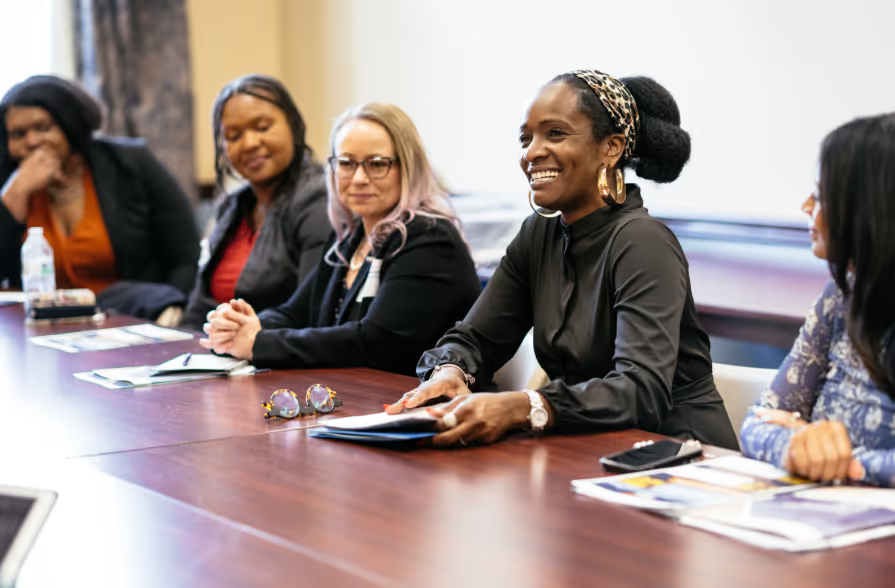At the Pennsylvania Educator Diversity Consortium (PEDC), we work to make this vision a reality. We believe that all students—no matter their race, ethnicity, identity, or background—benefit from having teachers who share and respect their experiences.
Our work spans early childhood to higher ed, aiming to grow culturally aware educators and build inclusive, transformational systems. We are committed to increasing representation and cultural understanding in every classroom.

Dr. Donna-Marie Cole-Malott PEDC Co-Director speaks with legislators during Advocacy Day at the Pennsylvania State Capitol in Harrisburg
PEDC began in October 2019 when Pennsylvania’s Secretary of Education, Pedro Rivera, launched the Aspiring to Educate (A2E) initiative. The A2E program started in Philadelphia and brought people together to tackle the challenges that educators of color often face—even as schools were adjusting to the effects of COVID-19.
A small group of people started the work, but it grew fast.
By March 2021, the group officially became the Pennsylvania Educator Diversity Consortium (PEDC). The co-founders—Donna-Marie Cole-Malott, Juliet Curci, and Karen Parker Thompson—helped shape the group into what it is today.
Today, PEDC is a 501(c)(3) organization backed by early funding from New Schools Venture Fund and support from the Heinz Endowments, McElhattan Foundation, William Penn Foundation, Spring Point Partners, and the Henry L. Hillman Foundation.
Our network includes hundreds of people and organizations working to make Pennsylvania’s education system more inclusive—and to inspire change beyond the state.
Our systems have not been designed to fully recognize, support, or reflect the brilliance of our communities.
Systemic barriers and backlash against equity work continue to challenge this mission. While the need rises, recruitment and retention of diverse educators remain difficult. Many face financial barriers, lack of representation, and unsupportive environments.
Without intentional structures for mentorship, wellness, and leadership development, we lose incredible educators each year. It’s not just a workforce crisis—it’s a loss of joy, wisdom, and connection.
This is about restoring dignity to the profession. Educators are essential—yet often denied the respect, pay, and wellness they deserve.
The need for change is urgent. So is the opportunity.

PA State Representative Regina Young speaks with educators
Across Pennsylvania, the call for educational transformation is growing louder. Not because our communities lack brilliance, talent, or potential, but because our systems have not been designed to recognize, support, value, and reflect them.
We need more than a few diverse educators in isolated classrooms—we need a vibrant, supported, and culturally relevant and sustaining educator workforce that spans every level of education. From teacher preparation programs to PK-12 schools, from deans to superintendents, from faculty chairs to principals, the face and practice of education must evolve to reflect the students we serve.
However, barriers persist. Systemic inequities, shrinking educator pipelines, and resistance to culturally relevant and sustaining education (CRSE) are compounded by a growing backlash against race and gender equity. Educators and leaders committed to this work are not just under-resourced—they’re under attack.
PEDC’s approach is rooted in collaboration and shared responsibility. We bring people and organizations together across the education ecosystem to create systemic, lasting change. Our work is guided by the Collective Impact framework—an equity-centered model for driving transformation at scale. Learn more about how we drive change. ➤
We’re finalizing our Common Agenda with our community, ensuring our vision and goals are grounded in shared purpose and shaped by those closest to the work.
We are establishing ways to measure progress collectively, so we can stay aligned, accountable, continuously learn, and be transparent in our impact.
At our SWPA regional hub, a dedicated working group is developing and piloting a shared measurement model, co-creating tools that reflect local needs and experiences while informing statewide learning.
At PEDC, our members and partner organizations collaborate toward a common purpose: advancing educator diversity and cultivating culturally relevant and sustaining educators, practices, and systems.
Mutually reinforcing activities are about aligning diverse efforts to drive collective progress. That means intentionally connecting each participant’s or organization's contributions—whether through policy, preparation, practice, or community engagement—to maximize shared impact.
This approach respects the different roles each of us plays while ensuring our efforts move in the same direction.
Ongoing communication keeps our work collaborative and coordinated. Through monthly statewide and regional convenings, newsletters, and interactive touchpoints, we stay connected, responsive, and informed.
From professional learning to working groups and our statewide Summit, each effort is distinct yet interconnected—working in harmony toward our shared vision.
By listening first and getting to know the values, strengths, and needs of our community members, we ensure that our communication strengthens alignment, trust, and impact across the network.
PEDC serves as the organizing intermediary—offering leadership, strategy, facilitation, and infrastructure to hold the vision and keep the work moving forward.
Our backbone team is also deeply committed to centering healing and wellness—for our community and ourselves—because sustaining the work means sustaining the people doing it.
Our work is also grounded in solidarity and guided by the principles of targeted universalism. We believe in a shared vision for educational equity—but recognize that achieving universal goals requires strategies that respond to the unique barriers different organizations face.
Solidarity means we stand together—not just in values, but in action. It is evident in our policy and advocacy working groups, summit, and other working groups, where members co-create solutions and collectively own the work.
Targeted universalism reminds us that while we’re all striving for the same destination—an education system where every student and educator can thrive—the pathways must be tailored to meet specific needs, especially for those most impacted by systemic inequities.
This work cannot happen in silos. It requires cross-sector collaboration and co-creation, where people bring their expertise, lived experience, and leadership to the table. Whether shaping policy, designing learning, or strengthening local networks, each of us has a role to play—and when we move in solidarity, we move with power.